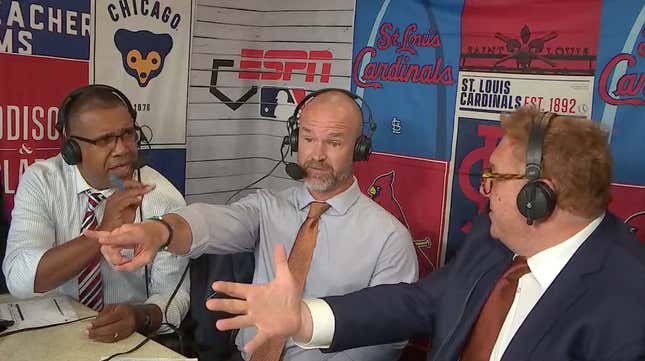
In the third inning of Wednesday night’s Cubs-Cardinals broadcast on ESPN, play-by-play guy Jon Sciambi brought up an interesting stat about the lousy season-long performance of the second-base and center-field positions for the Cubs. This line of thought led fellow commentator Eduardo Pérez to bring up Chicago’s recent trade to acquire Tony Kemp from the Houston Astros. In a matter of moments the conversation had become just the stupidest damn thing.
Kemp makes a ton of contact—he has an 85.2 percent contact rate, and has struck out just 105 times in 656 career plate appearances—but there’s a reason he only has 656 career plate appearances over four MLB seasons, just as there’s a reason he was in Triple-A at the time of the trade. He’s a low average hitter with no power, and if his habit of making lots and lots of light contact suits your idea of a “true leadoff hitter,” probably that idea needs an update. Frankly, the notion that a team should have a “true leadoff hitter” instead of just a plain old very good hitter at the top of their order is somewhat antiquated.
Sciambi lumbered in behind Pérez’s emphasis of the leadoff role, offering the “nerd” take that emphasizing a place in the order versus just getting the best possible batter is a misguided way of constructing a baseball team. It’s a reasonable point, and the Cubs are a handy example—for all the concern over the leadoff spot, they’re a respectable sixth in the NL in runs and runs per game, suggesting that however much they might be improved by having another good hitter, their lack of a traditional leadoff guy has not been devastating. Anyway, it’s certainly not the sort of thing where they’d need to emphasize traits beyond he gets on base a lot.
You could tell this was going to go bad as soon as Sciambi came in genuflecting, with the “nerd” qualifier, and third guy David Ross said “we’ll be the players, you be the nerd.” Pérez’s response to Sciambi, upon being challenged to back up his support of the “true leadoff man” with data, was the verbal equivalent of a faceplant:
“I beg to differ. What I do have, I do have some data on this side. It affects the guys behind you, especially a guy like Kris Bryant that was in the two spot for a long time. When the leadoff hitter does not get on, the guy in front of you does not get on, you cannot produce at a higher level when it comes to—you don’t have the opportunity to drive those runs in.”
First of all, what the hell kind of data is that? Second of all, the goal of Chicago’s lineup is not to provide Kris Bryant with lots of RBI opportunities! It’s to score lots of runs! If the Cubs got a leadoff hitter who socked a dinger every time he came to the plate with no one on base, he would never once convert those at-bats into RBI opportunities for Kris Bryant. He would also be the best leadoff hitter in baseball history. Sciambi failed to make that point, but he responded by pointing out Chicago’s perfectly solid run production with no “true leadoff hitter.” Now it was Ross’s turn to offer an extremely discouraging retort:
“But look at their record. It’s not about who’s producing. They’re definitely underperforming for what their expectations—for being fifth in the league in offense. Maybe it’s a factor. Maybe it’s not quantifiable!”
It’s all about wins, baby! As if to suggest that the magic of having a traditional leadoff hitter produces wins in ways that cannot be reduced to, uhh, scoring more runs than other baseball teams.
It would not be long before Sciambi lost the thread and found himself being made fun of for never playing professional baseball. He tried to bring it back around by citing models that show that lineup optimization isn’t all it’s cracked up to be, which was met by an extremely skeptical “they say” from Pérez, and then Ross counting the rings by citing the leadoff hitters of recent World Series champions. This made for some fairly unbearable television, and I mean to tell you here and now that this increasingly dumb argument lasted for an entire half-inning.
It wasn’t actually 20 minutes, although it sure as hell felt like it. The entire video is below. In related news, it was pointed out to me tonight that MLB TV allows viewers to select park noises as the audio feed of a live game broadcast, eliminating altogether the commentary of commentators. Keep it in mind for next Wednesday.